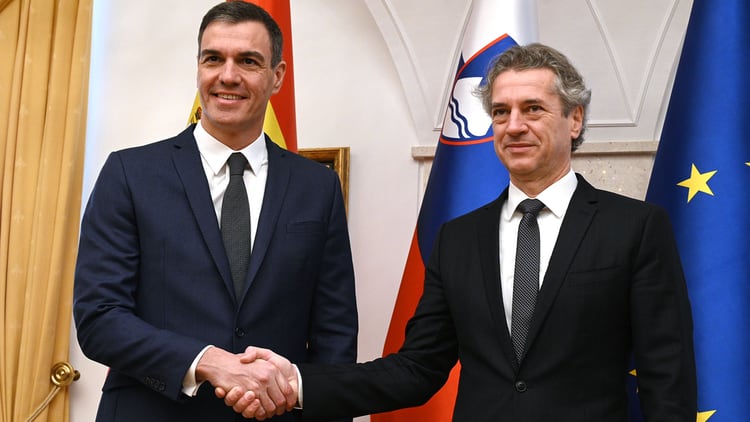Ángel Collado
Pedro Sánchez is betting on the Spanish presidency of the European Union next summer as his great personal trump card ahead of the elections at the end of the year, and he is already focusing on this objective, oblivious to his allies’ stumbling blocks.
In the midst of an internal government crisis over the “only yes is yes” law, with more than 500 rapists and paedophiles benefiting from the legal reform, the chief executive has made his first preparatory tour of the presidency, with stops in Austria, Croatia and Slovenia.
At the same time as Sánchez seeks to make amends in European foreign policy for the setbacks and the spectacle of cabinet division in domestic politics, his Podemos partners have not hesitated to reopen another front of dissent, and precisely on the main issue that occupies the EU in its own defence: military support for Ukraine.
As the election dates draw nearer -the regional and municipal elections on 28 May and the general elections between November and December- the party founded by Pablo Iglesias, now led by ministers Ione Belarra and Irene Montero,
Podemos is cultivating its more populist profile in the face of the government’s projects in the pipeline after seeing how Sánchez admitted last summer to the legal botch-up of the ‘only yes is yes’ that he now has to change. History has just repeated itself with the law to promote sex change, also Montero’s responsibility and accepted by Sánchez, despite the discomfort of the PSOE’s feminists, so as not to open another rift in his cabinet.
Despite Sánchez’s assumption of Podemos’ positions on social engineering, the leaders of the far-left party have not ceased to highlight their differences with foreign policy, an area in which the president of the government does exercise his authority by taking a pro-European and Atlantist line, the traditional line of the PSOE.
In order to prepare for the Spanish presidency of the EU, the Prime Minister intends to make specific visits to most EU countries before June. After travelling to Austria, Croatia and Slovenia last week, in March he will make time to travel to Ireland, Denmark and Finland, while he is trying to include Italy in another upcoming tour.
Podemos has no problem counter-programming the prime minister’s international promotion. With Sánchez out of Spain and surrounded by foreign leaders who support Ukraine in the face of the Russian invasion, Belarra, his minister for Social Rights as well as secretary general of Podemos, demanded a halt to the delivery of military equipment to Zelenski.
The leader of the populist party proposed that the Executive of which she forms part should not “follow the lead” of the United States, put an end to the “escalation of war” which, in her opinion, involves delivering arms to Ukrainian troops, and promote a diplomatic solution within the EU to the conflict unleashed by Putin.
Belarra gave as an example in “the search for peace” that Podemos advocates the left-wing governments of Latin American countries such as Argentina, Colombia and Brazil, which have refused to provide weapons to Zelenski despite having Russian material in their arsenals that could be used immediately by Ukrainian troops.
Sánchez, accused of being a warmonger, had to respond to his minister before returning to Spain to stress that one cannot be equidistant between Russia and Ukraine because in a war that he described as “pure colonialism” and in which it turns out that “there is an aggressor and an aggressed; and we are with the aggressed”.
If in the internal struggle for the banner of feminism Sánchez gave in to Podemos at the expense of the PSOE, on foreign policy the president of the government does not admit any competition or questioning.






